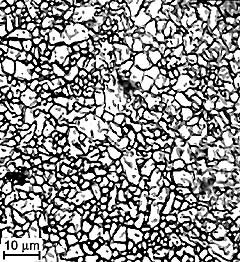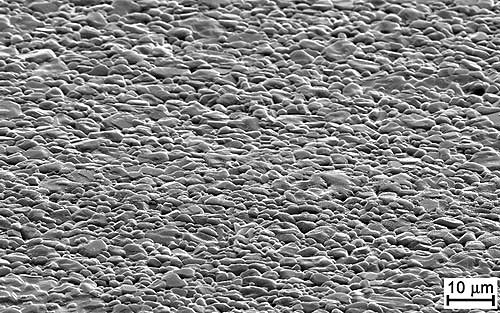3.4.2 Oxide Ceramics
3.4.2.1 Aluminium oxide
Aluminium oxide (Al2O3)
is the most important technical oxide ceramic material and
has the widest range of applications. Densely sintered aluminium
oxide is characterised by
These synthetically manufactured materials
with aluminium oxide contents ranging from 80 % to more than
99 %, have been proven in practice. The choice of this material
is determined by technical and economic criteria. A material
with higher aluminium oxide content does not necessarily fulfil
the needs of an application best.
It is also possible for the mechanical properties of aluminium
oxides from different manufacturers to vary, even when the
aluminium oxide content is the same, due to different powder
formulations.

Figure 6: Surface of an
aluminium oxide "as fired"
Figure 7: Microstructure of an aluminium
oxide ceramic (99.7 %)
Aluminium oxide materials satisfy all the
requirements of insulation materials for applications in electrical
engineering. Outstanding values for bending strength and for
resistance to wear and to high temperatures suit the material
to mechanical applications.
The microstructure, and therefore the other
properties, of aluminium oxide ceramics can differ markedly
(see Figures 8 and 9).
 Figure 8:
Figure 8: Microstructure of a micro-crystalline
aluminium oxide |
 Figure 9:
Figure 9: Microstructure of a coarse-crystal
aluminium oxid |
Surfaces with the highest possible bearing
area are not always either necessary or desirable. Thread
guides used in the textile industry, for instance, should
have a small contact area with the thread and should not have
any sharp edges, whereas sealing plates require a material
proportion of approx. 80 %.

Figure 10: "As fired"
surface of a extruded aluminium oxide
Due to their good price/performance ratio and their generally
useful properties, aluminium oxide ceramics are used
- in the sanitary industry as a sealing
element,
- in electrical engineering as insulation,
- in electronics as a substrate,
- in machine and plant construction as
wear protection (wear-resistant material),
- in the chemical industry as corrosion
protection (corrosion-resistant material, highly resistant
to vapours, melting and slag up to high temperatures) and
as a filter,
- in instrumentation as a protective tube
for thermocouples used for high temperature measurements
- in human medicine as an implant, and
- in high temperature applications as
a burner nozzle or as a support tube for heat conductors.
|
|

